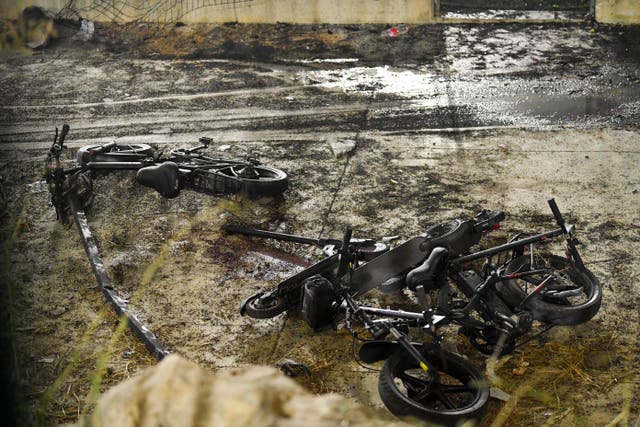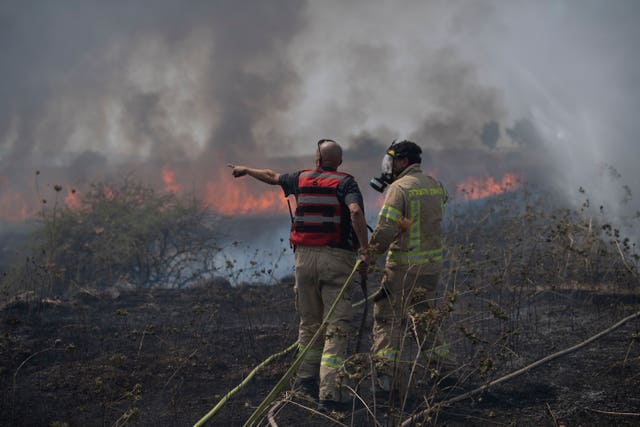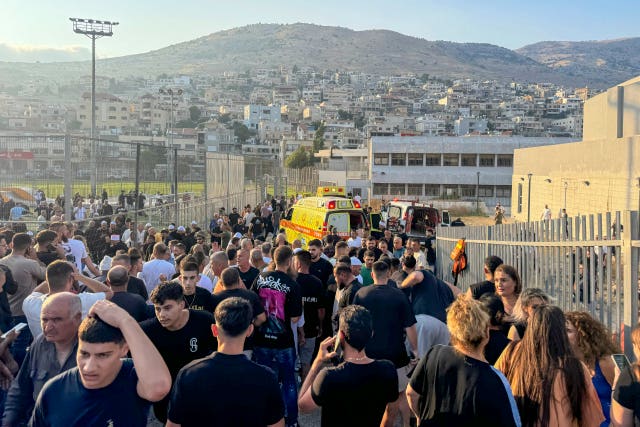Netanyahu says Hezbollah will pay ‘heavy price’ after Golan strike kills 11
Hezbollah, which has been blamed for the attack, has denied any role.

Israeli Prime Minister Benjamin Netanyahu warned that Hezbollah “will pay a heavy price for this attack, one that it has not paid so far,” his office said after a rocket strike on a football field killed at least 11 children and teenagers.
It is the deadliest strike on an Israeli target along the country’s northern border since the fighting between Israel and Hezbollah erupted, and risked unleashing a broader regional war.
Israel blamed the Lebanese militant group Hezbollah for the strike in the Israeli-controlled Golan Heights, but Hezbollah rushed to deny any role.
The Israeli military’s chief spokesman, Rear Admiral Daniel Hagari, called it the deadliest attack on Israeli civilians since the Hamas attack on October 7 that sparked the war in Gaza. He said 20 others were wounded.
“There is no doubt that Hezbollah has crossed all the red lines here, and the response will reflect that,” Israeli Foreign Minister Israel Katz told Israeli Channel 12. “We are nearing the moment in which we face an all-out war.”
Hezbollah chief spokesman Mohammed Afif told The Associated Press that the group “categorically denies carrying out an attack on Majdal Shams”.
It is unusual for Hezbollah to deny an attack.

The office of Mr Netanyahu, who was on a visit to the United States, said he would cut short his trip by several hours, without specifying when he would return. It said he will convene the security Cabinet after arriving.
Far-right members of Mr Netanyahu’s government called for a harsh response against Hezbollah. But an all-out war with a militant group with far superior firepower to Hamas would be trying for Israel’s military after nearly 10 months of fighting in Gaza.
The militant group said its fighters carried out 10 different attacks using rockets and explosive drones against Israeli military posts, the last of which targeted the army command of the Haramoun Brigade in Maaleh Golani with Katyusha rockets. In a separate statement, Hezbollah said it hit the same army post with a short-range Falaq rocket.
It said the attacks were in response to Israeli airstrikes on villages in southern Lebanon.
The strike followed earlier cross-border violence on Saturday, when Hezbollah said three of its fighters were killed, without specifying where.

Israel’s military said its air force targeted a Hezbollah arms depot on the border village of Kfar Kila, adding that militants were inside at the time.
Footage aired on Israeli Channel 12 showed a large blast in one of the valleys in the Druze town of Majdal Shams, in the Golan Heights, which Israel captured from Syria in the 1967 Mideast war and annexed in 1981.
Video showed paramedics rushing stretchers off the soccer field toward waiting ambulances.
Ha’il Mahmoud, a resident of Majdal Shams, told Channel 12 that children were playing football when the rocket hit the field.
He said a siren was heard seconds before the rocket hit, but there was no time to take shelter.
The White House National Security Council condemned the attack without directly blaming Hezbollah, adding that the US “will continue to support efforts to end these terrible attacks along the Blue Line, which must be a top priority”.
The statement added: “Our support for Israel’s security is iron-clad and unwavering against all Iranian-backed terrorist groups, including Lebanese Hezbollah.”

Lebanon’s government in a statement, without mentioning Majdal Shams, urged “immediate cessation of hostilities on all fronts” and condemned all attacks on civilians.
Israel and Hezbollah have been trading fire since October 8, a day after Hamas militants stormed into southern Israel.
In recent weeks, the exchange of fire along the Lebanon-Israel border has intensified, with Israeli airstrikes and rocket and drone attacks by Hezbollah striking deeper and farther away from the border.
Saturday’s violence comes as Israel and Hamas are weighing a ceasefire proposal that would wind down the nearly 10-month war and free the roughly 110 hostages who remain captive in Gaza.
Hamas’ surprise attack on October 7 killed some 1,200 people and took 250 others hostage.
Israel launched an offensive that has killed more than 39,000 people, according to local health authorities.
Since early October, Israeli airstrikes in Lebanon have killed more than 450 people, mostly Hezbollah members, but also around 90 civilians and non-combatants.
On the Israeli side, 44 have been killed, at least 21 of them soldiers.





